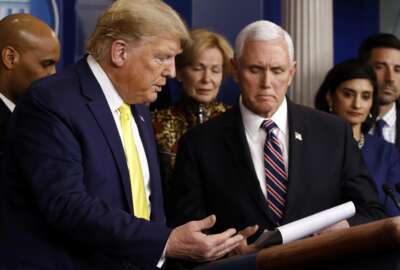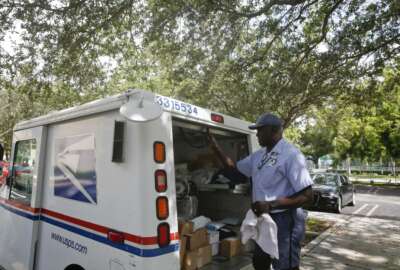
Sometimes federal work is downright hazardous
Some exposed employees got the virus in the line of duty. Now they're suing for extra pay.
When a folksy old doctor gets death threats, you know federal employment can come with real hazards. But alas, it’s true. For perhaps incomprehensible reasons, the ubiquitous Dr. Anthony Fauci must have a security detail now. This, thanks to bizarre stuff appearing — where else but on social media. Judging on what I’ve seen, I’d classify a lot of it as anti-social media.
Reading and watching this, I thought, to have a good federal retirement you’ve got to live to get there. It’s easy to forget that, although it’s rare, a few federal employees each year do die in the performance of their duties. You may not remember Vernon Hunter. He was an IRS manager killed when a man feuding with the IRS committed suicide in 2010 by crashing his small airplane into the IRS offices in Austin, Texas.
In reality, Fauci, a compact whirlwind of energy and knowledge, represents the best in career public service. And normally the position as director of one of the institutes within the National Institutes of Health — in Fauci’s case Allergies and Infectious Diseases — would not be considered hazardous duty. Although if the director were to spend a day or part of a day in the lab, handling or being potentially exposed to some terrible germ, he or she might qualify for the official definition of hazardous duty, and therefore receive a pay bump for that day.
Down at the ground level, thousands of working feds are working under conditions they believe constitute hazardous duty. As we’ve reported, D.C. lawyer Heidi Burakiewicz — of shutdown back pay fame — has launched a class action lawsuit against government for hazardous duty differential pay. Five named defendants work for the Agriculture Department, the Bureau of Prisons, and Veterans Affairs.
The suit cites Title 5, Office of Personnel Management guidance, and the Centers for Disease Control and Prevention to craft the case that the defendants worked in hazardous conditions and should have received the pay bump for it. The plaintiffs were exposed to coronavirus — a “virulent biologic” — by proximity to people and things contaminated with it.
The defendants also qualify as underdogs. They’re not the executives, like Fauci, swept up into the stratosphere of presidential press conferences, cable news frenzies and social media notoriety. For instance, Jason Phillips, a radiology technician at the VA medical center in Portland, Oregon. No one warned him before he performed a procedure on a patient who had already tested positive for coronavirus.
Burakiewicz told me, “This employee later contracted the coronavirus and tested positive himself. And took it home to his wife and young children, and his very elderly father-in-law who lives with him.”
She said the family is now recovering.
BOP employees Jerrod Carrier, George Guice, and Aubrey Melder accompanied infected prisoners, some with obvious symptoms, in cramped vans or otherwise worked in close proximity to prisoners with coronavirus. Melder is a senior officer. Carrier and Guice are wage grade employees, a maintenance worker and a food service foreman. Not the exalted ones, but certainly deserving of the warnings and protective gear they did not receive, besides the hazardous duty pay.
Then there’s Brenda Braswell, who, as an Agriculture Department consumer safety inspector, worked in one food plant without protective gear in proximity to an infected employee. Usually it’s the food that carries any danger.
In reading the OPM guidance, you’ll find a lot of nuance to go through. The defining paragraph: “Hazardous duty is duty performed under circumstances in which an accident could result in serious injury or death. Duty involving a physical hardship is duty that may not in itself be hazardous, but causes extreme physical discomfort or distress and is not adequately alleviated by protective or mechanical devices.”
But sometimes the examples seem pretty clear, especially if you look at the more detailed Appendix A of the relevant part of Title 5. Scroll down and see the reference to “virulent biologicals.” That would seem to fit the nasty little coronavirus. It’s there, not far under working on a drifting sea ice floe.
If you’re exposed, it is incumbent on management to investigate whether you receive the differential pay. Federal employment attorney Ricardo Pitts-Riley, partner at The Federal Practice Group, pointed out that the minimum period for which you can qualify for hazardous duty pay is one shift. Even if, during that shift, you only spent a few minutes in the line of fire, so to speak.
Hazardous duty, Pitts-Riley said, also includes travel in dangerous weather, exposure to hazardous agents like volatile chemicals, working at extremely high altitudes, or research underwater.
More importantly, hazardous duty requires a little collaboration between employee and management. Ricardo-Pitts said it’s incumbent on employees to raise their hands if they feel an assignment or task is hazardous. In the case of a VA technician, it’s hard to see how he might of known how close he was to the virus when people who did know said nothing.
As for management, Ricardo-Pitts said, “It is incumbent on a manager, then, to consult with human resources and to determine whether or not that employee is actually entitled to hazardous duty pay.” Ultimately, the agency decides, on the presumption “it has the best idea and understanding of what they’re asking their employee to do and what their employee has actually been exposed to.”
Maybe BOP and the others felt they didn’t have the money to cover the hazardous duty pay. Still, as Ricardo-Pitts said and Burakiewicz acted on, sometimes the agency gets it wrong.
Nearly Useless Factoid
Before the invention of the telephone, “hello” was used to draw attention or express surprise, not as a greeting. Thomas Edison suggested using it as a standard greeting when answering the telephone. Alexander Graham Bell, on the other hand, advocated for “ahoy.”
Source: Wonderopolis
Copyright © 2024 Federal News Network. All rights reserved. This website is not intended for users located within the European Economic Area.
Tom Temin is host of the Federal Drive and has been providing insight on federal technology and management issues for more than 30 years.
Follow @tteminWFED





